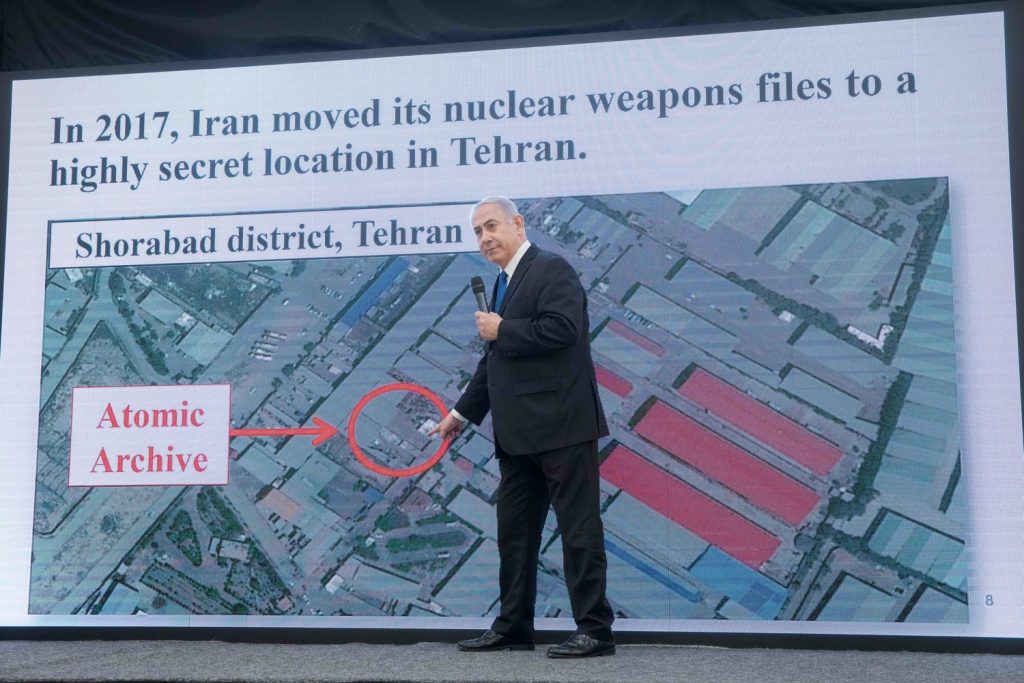IN THE MEDIA
Bibi’s revelations highlighted Iran deal’s failings
May 10, 2018 | Tzvi Fleischer

Tzvi Fleischer
Australian Jewish News – May 10, 2018
On April 30, Israel’s PM Binyamin Netanyahu revealed one of Israel’s greatest intelligence coups – that it had obtained an entire archive of around 100,000 secret files on Iran’s nuclear program. According to media accounts, in January Israeli spies broke into a secret Teheran warehouse, stole the documents and brought them back to Israel the same night. The stolen files mostly relate to the Iranian nuclear weapons program called “Project Amad”, which formally ended in 2003 – but actually continued in various different forms until 2009. They completely discredit repeated claims by Iranian leaders that their nuclear program has only ever been for peaceful purposes.
The authenticity of the Iranian files has been backed by US Secretary of State Mike Pompeo, who stated, “The documents show that Iran had a secret nuclear weapons program for years… Iran hid the vast atomic archive from the world and from the IAEA [International Atomic Energy Agency] – until today.”
Netanyahu’s public presentation was almost certainly timed for the lead-up to US President Donald Trump’s announcement on Tuesday that the US would be withdrawing from the nuclear deal with Iran – in which he indeed cited Israel’s new intelligence revelations. Netanyahu likely did not know the details of what Trump would say, but did know that Trump was going to decide shortly whether or not to certify to the US Congress that the Iran nuclear deal signed in 2015 – known officially as the Joint Comprehensive Plan of Action (JCPOA) – is being complied with and is in the US national interest. Netanyahu knew Trump was considering withdrawing and would have wanted to encourage that outcome and also help counter the arguments of critics of such a withdrawal, particularly the Europeans.
We only know what has been publicly released about the nuclear files captured by Israel – which clearly is not everything in them. However, Netanyahu offered the following key conclusions from the discovery: first, “Iran lied about never having a nuclear weapons program”, second, “even after the deal, Iran continued to preserve and expand its nuclear weapons know how for future use”, and third, “Iran lied again in 2015 when it didn’t come clean to the IAEA as required by the nuclear deal.”
Netanyahu reportedly rang various international leaders, including Australian PM Malcolm Turnbull, last weekend to urge them to consider the implications of Israel’s intelligence bonanza.
Critics of Netanyahu’s presentation claim that there is little new information, and no “smoking gun” demonstrating ongoing Iranian violations since the JCPOA was implemented in January 2016.
Such claims appear facile, designed to protect the JCPOA from criticism rather than to genuinely assess the evidence. David Albright, a former UN weapons inspector in Iraq and current head of the Washington-based Institute for Science and International Security, said of the Israeli revelations that while some information in Netanyahu’s brief was known to the IAEA inspectors, “Here we have a jigsaw puzzle with 30 to 40 percent of the pieces [turned into] one that has 99 percent of the pieces.” He also noted that the mere existence of the Iranian secret nuclear archive itself is clear evidence that Iran has not ended its nuclear weapons program but merely moved it underground so it can “pop up” and quickly produce nuclear weapons at a convenient time.
Olli Heinonen, a former deputy director general of the IAEA, called the Israeli revelations a “jackpot” and said they definitely contained “new information”. For instance, he noted that pictures presented by Netanyahu showed previously unknown nuclear equipment, adding, “They must have manufactured pieces of equipment in Iran. Where are those pieces? Who is keeping them?”
Critics of the JCPOA point to five key problems with it:
1. Key restrictions on Iran’s nuclear activities, including uranium enrichment, expire in 7 to 12 years, allowing Iran a free hand to build a massive nuclear program thereafter.
2. It allows Iran to continue research and development on advanced centrifuges to enrich uranium, which will allow Iran to vastly speed up enrichment once its restrictions expire.
3. Iran has been able to effectively make “military sites” off limits to IAEA inspectors, making it impossible to know if forbidden work on weapons is occurring there.
4. The JCPOA did not deal with Iran’s development of ballistic missiles, a key component for any nuclear weapons program. Iran has surged forward with missile testing since the JCPOA came into force, conducting as many as 23 ballistic missile tests – more than North Korea.
5. Finally, the JCPOA does nothing about aggressive Iranian behaviour in the Middle East – fighting bloody proxies wars in Syria and Yemen, threatening virtually all its neighbours and funding terrorists groups like Hezbollah and Hamas. Indeed, the JCPOA provided Iran with US$100 billion or more in previously frozen funds which seems to have been spent to accelerate Iran’s destabilising regional activities.
Any reasonable reading of Netanyahu’s release of these archives should significantly strengthen the case that the JCPOA was far from the solution to the Iranian nuclear problem – especially given Iran’s increasing regional aggression since its implementation. At the very least it needs be supplemented with additional strong measures, if not completely renegotiated or replaced – and, as Trump suggested in his statement, his unequivocal decision may open new possibilities to do so. Continuing with the status quo would have lead to a future Iranian nuclear problem likely to be much more dangerous and detablising that even the current crisis over Korea.
DR TZVI FLEISCHER is editor of the Australia/Israel Review at the Australia/Israel & Jewish Affairs Council (AIJAC), and has a PhD in international politics from Monash University.
Tags: International Security





